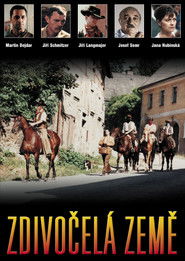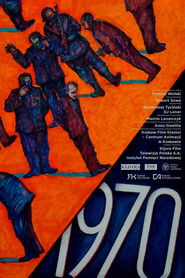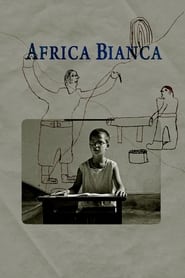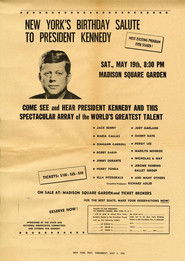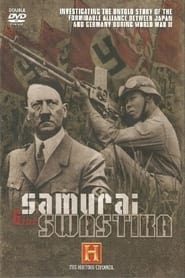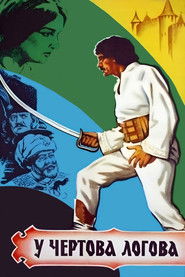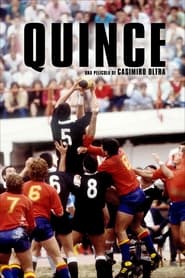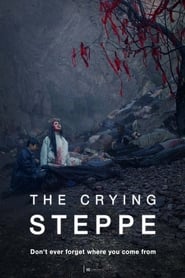Top Rated History Movies - Page 302
-
Zdivočelá země
1997
Zdivočelá země
1997
star 1.3After World War II, fighter pilot Antonín Maděra returns from England to his native village in the Ore Mountains to forget the hardships and horrors of war and to "live, work, and love his neighbors," as he himself says. But Svatý Štěpán, which his family had to leave in 1939, is no longer the same place it used to be. However, even in his wildest dreams, he could not have imagined what really awaited him there. -
1970
2021
1970
2021
star 7.7Poland, 1970. When popular protests erupt in the streets due to rising prices, the communist government organizes a crisis team. Soon after, the police use their truncheons and then their firearms. The story of a rebellion from the point of view of the oppressors. -
The Imperial Lullaby
2020
The Imperial Lullaby
2020
star 5.3The armies of Fascist Italy conquered Addis Ababa, capital of Abyssinia, in May 1936, thus culminating the African colonial adventure of the ruthless dictator Benito Mussolini, by then lord of Libya, Eritrea and Somalia; a bloody and tragic story told through the naive drawings of Pietro Dall'Igna, an Italian schoolboy born in 1925. -
Magdalena Dobromila Rettigová
1961
star 3.3The story of a Czech national revivalist, writer and author of a famous cookbook... The story takes us to Litomyšl in 1836. The local bourgeois society, which does not fail to interject a German word into their conversation as proof of good upbringing and better origin, slanders Mrs. Rettigová. "Rettička" not only fights for standard Czech, is a patriot, but also attracts young girls and students to her and lends them Czech books. She simply disrupts the good old order. Another sensation in the town is caused by the announcement of a planned wedding. Maiden Lenka will marry old doctor Plavec. When Mrs. Rettigová finds out about it, she invites both fiancés to her, each separately. The hunter Valenta, Lenka's former admirer, who had been abroad with his master for a long time, asked her to help him get Lenka back... -
Svědek umírajícího času
1991
star 4.7At the beginning was the Slovak television series Lekár umierajúceho czasu (Doctor of Dying Time), dedicated to the Rudolphine-era scientist Jan Jesenius. He ended up on the scaffold along with other gentlemen after losing the anti-Habsburg uprising. When director Miloslav Luther conceived the idea of making an abridged version of the footage for cinema, he had to not only rebuild the storyline but also dub it into Czech. However, the result was only an illustrative puzzle, describing the various stages of the hero's turbulent life. -
Romania: Seeking Dracula's Castle
2020
star 8.7Husband and wife team Greg and Felicity take a journey across Romania to try to answer one simple question - where is Dracula's Castle? Along the way they struggle as fiction, history and legend all mix together to confuse the question, but they get to experience some of the incredible beauty and impressive castles of Romania. -
President Kennedy's Birthday Salute
1962
star 7.3President Kennedy's birthday celebration was held at the third Madison Square Garden on May 19, 1962, and more than 15,000 people attended, including numerous celebrities. The event was a fundraising gala for the Democratic Party. Features Marilyn Monroe singing to JFK. -
Life and Passion of Christ
1907
star 6.3The story of the life and passion of Jesus Christ, from the proclamation of his birth to his ascension into heaven. -
Samurai and the Swastika
2006
star 7.7Chronicles the strategic alliance between the Axis powers. Examines how Japan supplied Germany with much-needed raw materials for the war, while German engineers shared sophisticated rocket and jet-propulsion technology with their Japanese counterparts. Jointly, they supported anti-English uprisings in India, giving aid and military supplies to Bose Chandras, a dissident Indian general, and his guerilla army. They conspired to destroy the Panama Canal and cut off America's Pacific war from its crucial Atlantic supply operations. Uses computer animations to illustrate this plan. -
Visions from a Jail Cell
1986
star 7Childhood can be said to be the best and most carefree stage of life. Looking back, we have forgotten many fragments of childhood, but never deny her unforgettable warmth. However, for children who are exposed to the flames of war and oppression, their childhood is cold and cruel. Xiaoluotou is a poor child who has lived in prison since the day he was born. His mother is a Communist, so he was brutally persecuted by the Kuomintang reactionaries. He is a prisoner of the Kuomintang, and the beetle on the sand is a toy of a small carrot head. Death and killing locked the child's footsteps, but could not seal his free-spirited imagination. In his mind, schools and prisons are no different, and the teacher’s laughter is unbearable. The prison is a black home filled with murderous children. He is flying freely above the prison... -
Lebanon in Crisis
2020
Lebanon in Crisis
2020
star 5.7The apocalyptic blast in the Port of Beirut, Lebanon, on August 4, 2020, exacerbates anger at those in power: protests cross religious boundaries as the Lebanese people curse corruption, nepotism, gross economic mismanagement and squandering of resources. How did the Land of Cedars, a country with so much to offer, allow itself to get into such a dire situation? And will it be able to bounce back? -
At the Devil's Lair
1981
At the Devil's Lair
1981
star 8.5XVIII century. Moldova under Turkish yoke. The local nobility collaborates with the enslavers. Throughout the district in Moldova, the fame of a detachment of haiduks under the leadership of Gruya thundered, instilling fear in the lords and boyars. But Gruya was killed. Imagine the surprise of the authorities when they learned that a new Gruya had appeared and was preparing revenge. -
The Black Book
2020
The Black Book
2020
star 8The Black Book, drafted during World War II, gathers numerous unique historical testimonies, in an effort to document Nazi abuses against Jews in the USSR . Initially supported by the regime and aimed at providing evidence during the executioners’ trials in the post-war era, the Black Book was eventually banned and most of its authors executed on Stalin’s order. Told through the voices of its most famous instigators, soviet intellectuals Vassilli Grossman, Ilya Ehrenburg and Solomon Mikhoels, the documentary, provides a detailed account of the tragic destiny of this cursed book and puts the Holocaust and Stalinism in a new light. -
Návrat pana Ryšánka
1971
-
Quince: el documental
2021
star 7A journey through the golden age of Spanish rugby, from the late eighties to the early nineties: the incredible story of men who, with hard work, effort and perseverance, proved that any goal can be achieved. -
The Crying Steppe
2020
The Crying Steppe
2020
star 5.5In the 1920-30s, 70% of the indigenous population died from the Great Famine created by the Bolsheviks in Kazakhstan. Overcoming the dreadful fear of death and despair, an eagle hunter's family from a Kazakh village in the highlands is trying to stay alive in the midst of the fierce winter and face a moral choice, to die as human beings or to survive at any cost, transgressing the human decency.
 Netflix
Netflix
 Amazon Prime Video
Amazon Prime Video
 Apple iTunes
Apple iTunes
 Apple TV Plus
Apple TV Plus
 Disney Plus
Disney Plus
 Google Play Movies
Google Play Movies
 Paramount Plus
Paramount Plus
 Hulu
Hulu
 HBO Max
HBO Max
 YouTube
YouTube
 fuboTV
fuboTV
 Peacock
Peacock
 Peacock Premium
Peacock Premium
 Amazon Video
Amazon Video
 The Roku Channel
The Roku Channel
 AMC+
AMC+
 Kocowa
Kocowa
 Hoopla
Hoopla
 The CW
The CW
 Vudu
Vudu
 Starz
Starz
 Showtime
Showtime
 PBS
PBS
 Pantaflix
Pantaflix
 FXNow
FXNow
 Tubi TV
Tubi TV
 Kanopy
Kanopy
 Comedy Central
Comedy Central
 Crunchyroll
Crunchyroll
 Microsoft Store
Microsoft Store
 Redbox
Redbox
 Sun Nxt
Sun Nxt
 ABC
ABC
 DIRECTV
DIRECTV
 Crackle
Crackle
 Fandor
Fandor
 Plex
Plex
